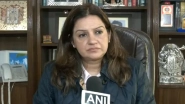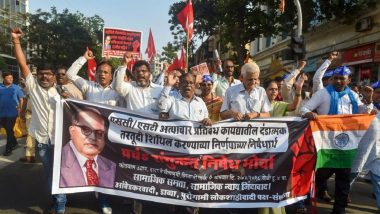New Delhi, Apr 3: The Supreme Court on Tuesday refused to stay its order on SC/ST (Prevention of Atrocities) Act, 1989. The two-judge bench of Justices A K Goel and U U Lalit, while hearing the government's review petition, asked all parties involved to pass a detailed reply within two days.
The court said it would hear the matter again after 10 days. During the course of hearing, Attorney General KK Venugopal pressed upon the bench to amend its recent order which has compelled scores of members of the SC/ST community to launch a protest.
However, senior advocate Amrendra Sharan, who is assisting the court as an amicus curiae in the case, said the threat to law and order cannot force the judiciary to amend its ruling. Instead, he said, the government should gear up its efforts to prevent deterioration of law and order.
In the Bharat Bandh called on Monday, nine people lost their lives as clashes were reported in various parts of the nation.
The worst brunt of the protest was felt in Madhya Pradesh, where six people lost their lives - three were killed in Gwalior, two in Bhind and one in Morena.
One protester was killed each in Uttar Pradesh's Muzaffarnagar and Meerut region. Another protester lost his life in Rajasthan's Alwar.
The top court, however, questioned the rationale of the protest, claiming that its order has "not diluted" the provisions of the SC/ST Act.
"Those agitating on streets may not have even read our judgment. Vested interests are also involved sometimes. We are only concerned about innocent people being put behind bars. We are not against the Act at all. But innocents can’t be punished on unilateral version. Why does government want people to be arrested without verification," the bench observed.
The bandh was called to oppose Supreme Court's order on March 20 which allegedly diluted the SC/ST Act. The apex court had struck down the provision of immediate arrest, apart from allowing the accused to seek anticipatory bail.
In case the complaint is filed under the law against a government employee, he/she could be booked only after approval from the appointing authority, the bench of Justices Goel and Lalit had said. In case, the accused is a non-government employee, the FIR could be registered only after a preliminary enquiry conducted by a DSP-level officer.
(The above story first appeared on LatestLY on Apr 03, 2018 04:05 PM IST. For more news and updates on politics, world, sports, entertainment and lifestyle, log on to our website latestly.com).













 Quickly
Quickly


